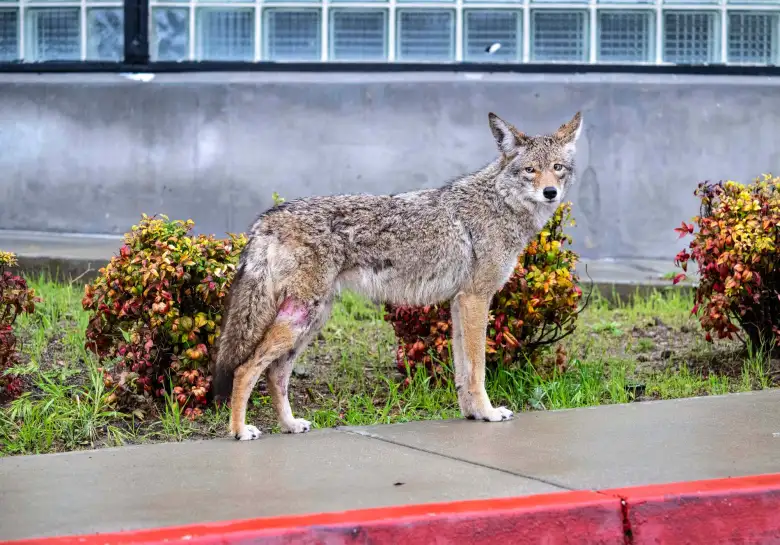Column: During ‘coyote pupping season’ beware when walking your dog

March to May is coyote pupping season, a time when we see an increase in coyote and human conflict. Prevention is key when walking your dog. Always keep them on a leash and stay vigilant. To learn more about peacefully co-existing with coyotes, visit pasadenahumane.org/coyotes. In the file photo: A coyote pauses after walking through the parking lot of Foothill High School in North Tustin just after noon on Thursday, Feb. 1, 2024. The school is located at the intersection of Dodge Avenue and Newport Boulevard. (Photo by Mark Rightmire, Orange County Register/SCNG)
The reason I’m embarrassed — because it was my son’s fault! Who goes jogging in the Arroyo at night with two dogs? And, the dogs were off leash!! Where do I begin to express my shame?
It brings to mind the story of the cobbler whose children had no shoes. How is it that MY son had no awareness of everything wrong with this picture?
I fear I have failed as a mother. My only excuse is that James was raised in Virginia, where we didn’t worry about coyotes.
Thankfully, whippets are fast, and Lily was able to easily outrun the coyote. The risk of infection required a trip to the vet to clean her small wound and start a round of antibiotics. Obviously, the situation could have been much worse.
The incident reminded me that we must continually educate ourselves and our loved ones about how to peacefully coexist with our wild neighbors.
First of all, keep your dogs on a leash! And always be vigilant with dogs and small children, even in your own yard.
Right now, we are in coyote pupping season. March to May is a time when we see an increase in coyote-human conflict. That’s why prevention is key when walking your dog.
It’s helpful to understand that coyotes live in packs. Only the pack leaders — the “alpha pair” — mate and reproduce, generally mating for life. They breed once per year, and if successful, produce litters of four to seven pups.
Pups are reared in dens until they are about two months old. The whole pack helps to raise them. The pack might have multiple dens and move the pups to keep them safe.
You may see more coyotes during the day in pupping season. Adults in the pack are out searching for food for the new mom and her offspring, as well as patrolling to protect the den from coyotes outside the pack.
Coyotes may also engage in “escorting” behavior, which is often mistaken as stalking, explains Lauren Hamlett, Pasadena Humane’s Director of Wildlife Education.
Escorting is when a coyote watches or follows people from a distance to ensure you aren’t getting too close to their den.
Escorting is most commonly experienced by humans out on walks with their dogs, rather than by people alone. Coyotes are not big fans of our canine companions.
If a coyote gets too close for comfort while escorting you and your dog, turn and face it. Make firm eye contact while keeping your dog close to you. This is often all that is needed to make the coyote keep its distance.
We recommend always carrying some kind of hazing device like an air horn, umbrella or noisemaker. Hazing, or scaring, coyotes by being loud and large keeps coyotes wild by reinforcing a healthy fear of humans.
That said, during pupping season, if you happen upon a coyote that is clearly near its den or with its pups, do not attempt hazing. The coyote is likely to stand its ground to protect the pups.
Instead, calmly walk away while maintaining eye contact with the coyote.
Do not run, as this may encourage the coyote to give chase.
I frequently see coyotes when walking my dog in our Poppy Peak neighborhood. Unlike my son, I have never had an unpleasant incident by following these tips. My Mother’s Day resolution is to be a better mom!
To learn more about peacefully co-existing with coyotes, visit pasadenahumane.org/coyotes
Dia DuVernet is president and CEO of Pasadena Humane.
This blog post originally appeared as a column in the Pasadena Star-News on May 10, 2024.


